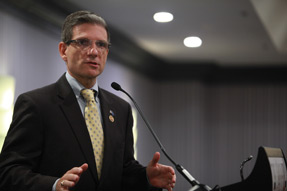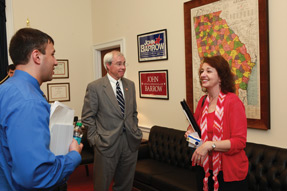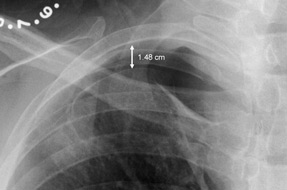ACP members take the Hill to tackle SGR and sequestration
Senators and representatives heard directly from ACP members about pressing priorities in health care.
It was all about the numbers at ACP's Leadership Day 2013. As usual, a major focus of the College's annual two-day gathering on Capitol Hill was the elimination of the sustainable growth rate (SGR) cuts to Medicare payments.
“I've been up here 12 years in a row, and I've been talking about the same thing,” Jacqueline W. Fincher, MD, MACP, told Rep. John Barrow (D-GA) during a Hill visit.

But the good news is that recent declines in health care spending growth have made permanent resolution of this issue a little more likely, Robert B. Doherty, ACP's senior vice president for governmental affairs and public policy, told Leadership Day attendees on May 21.
“The SGR is on sale right now,” he said. Due to slowing cost growth, the Congressional Budget Office has lowered the projected cost of eliminating the SGR from $230 billion to only $139 billion.
“Only in Washington can you use the words ‘only’ and ‘billion’ in the same sentence,” joked Rep. Joe Heck (R-NV) during a speech to Leadership Day attendees.
Rep. Heck, who is an emergency medicine physician in Las Vegas, is a sponsor, along with Rep. Allyson Schwartz (D-PA), of a bipartisan proposal to eliminate the SGR and move toward a value-based payment system.
Rep. Heck, and ACP leaders, encouraged College members to request support for the bill, H.R. 574, during visits with their senators and representatives by touting the new SGR cost data.
During the visits, however, the legislators seemed most struck by some smaller numbers. “I'm around $250,000 in debt with my college and medical school loans,” Eduard R. Fatakhov, MD, MBA, ACP Resident/Fellow Member, told Rep. Barrow.
“A quarter of a million. That's enough to buy a really nice house in Augusta that you'll never have,” replied the congressman.
Funding for programs to entice young physicians like Dr. Fatakhov to enter internal medicine, especially primary care practice, was a major focus of the Leadership Day visits.
The sequestration cuts that went into effect in March have had damaging effects on a number of physician workforce programs:
Essential health care programs affected by sequestration include:
- National Health Service Corps,
- Section 747, Training in Primary Care Medicine,
- National Health Care Workforce Commission,
- Agency for Healthcare Research and Quality (AHRQ),
- Health Resources and Services Administration (HRSA)
Medical research funding, through the National Institutes of Health and the Centers for Disease Control and Prevention, has also been decreased.
“Instead of the hatchet job of sequestration, we physicians would like to use our scalpels to make cuts,” said Dr. Fincher. She and her colleagues asked Congress to restore full funding to several workforce and research programs and recoup the costs by making cuts in specific areas identified by the College as unnecessary or low-value.
Of the many interest groups lobbying Congress for exceptions to the sequester, “We're the only ones that have offered concrete ways to reduce spending,” said Mr. Doherty.

The list of proposed savings, and the College's general focus on high-value, cost-conscious care, clearly appealed to the legislators. “I'd love to see that, and I love that you're partnered with Consumer Reports,” Rep. Michelle Lujan Grisham (D-NM) told the ACP members who visited her to talk about the College's work and proposals.
Rep. Grisham also expressed interest in restoring the workforce programs affected by sequestration, although she noted that some of her colleagues oppose any legislation to exempt specific programs from the cuts. “If we piecemeal it, too much of it stays in places where it has a disastrous impact,” she said. “It would be great if we could repeal the whole thing.”
However, a piecemeal proposal might be able to attract Republican support, she speculated. “Maybe we can get a coalition of folks who are worried about health care delivery,” she said.
The physicians encouraged her to give it a try. “Most of us are direct beneficiaries of these [workforce] programs. It's one of the reasons why I came to New Mexico and plan to stay,” said ACP Member Brianna J. Cowan, MD.
Rep. Grisham expressed her gratitude for the physicians providing primary care to her constituents. “I don't know that the whole world understands the sacrifices you make for quality health care, but I do,” she said.
The legislators and their staff members generally expressed appreciation and understanding of ACP members' concerns. Rep. Barrow, who is an attorney, showed interest in the College's ideas about reforming malpractice law and piloting no-fault health courts.
“I very much think we ought to create safe harbors for practitioners,” he said. “I definitely think we have to crack down on frivolous lawsuits.”
If lawyers and doctors can seek common solutions to malpractice reform, then perhaps agreement between congressional Republicans and Democrats could be possible someday.
Most of the physicians in Congress are Republican, noted Rep. Ami Bera, MD, FACP, a Democrat from California who was elected to the House last year and spoke at Leadership Day.
“I don't think there's anything partisan about health care,” said Rep. Heck, describing his efforts to start a bipartisan physician caucus in the House. “We're hopeful that we'll gain some traction and attract some people from both sides, so it's not just two of us having lunch and talking about how to save the world.”




